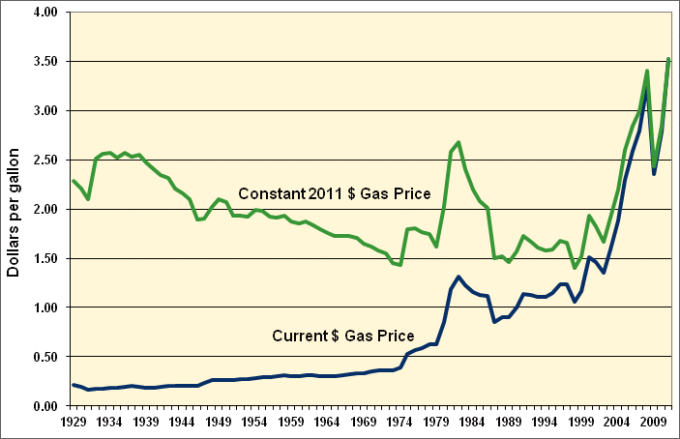Archive for June 22nd, 2013
Why is the price of gas magically tied to inflation only after 1974?
Posted by afarianc in on June 22, 2013
NOTE: These are just my observations and opinions, so read it accordingly. Dates are approximate, +/- 1 year. Higher accuracy is not really necessary to make a point or for the purposes of this article.
If you look at this chart as an economist one thing jumps at you–Oil prices were rising higher than inflation until a certain time period (1974), when oil prices got tied directly to inflation. Why is this? Take a look:

(Source: Energy.gov*)
We see the period of 1929-1974 as a time when the actual price of oil (as, for the lack of a better ratio, % of one’s salary) was getting cheaper while what the U.S. paid for a gallon of gas was rising. 1973-1979 was a little confused, as a strategy was being created, because as you can see the correlation after 1979 is drastically different.
So from 1929-1973 our buying power was rising faster than the price we paid for a gallon of refined gas that we pumped in our tanks. Simply put, the net price of gas was really getting cheaper. This can be seen by looking at the price of Gas as adjusted in 2011 dollars in the chart above.
A simple example would be this:
- Gas price is $1/gal and you are making $1000/mo.
- Gas price goes to $1.50/gal and you are making $1700/mo
- Gas prices go to $2/gal and you’re making $3000/mo
But looking at the chart, the example would be different after 1974, it would be something like this (I said something like this, humor me):
- Gas price is $1/gal and you are making $1000/mo.
- Gas price goes to $1.50/gal as you are making $1500/mo
- Gas prices go to $2/gal as you’re making $2000/mo
Somehow it got tied to inflation. My thoughts are that the OPEC economists figured out what the optimum production to consumption ratio was to keep prices steady. So if there’s inflation, then they produce less, drive the price of crude higher, then when inflation slows down, they increase production to get crude prices to drop, and adjust itself to inflation.
Another and more likely scenario is that the oil refineries are making the calculations and the adjustment. So if inflation is higher, then their adjustments in price for actual refined end product would rise to keep in sync with inflation; Therefore as inflation rises, so does their profits provided they keep their costs from growing at a rate less than the rate of inflation.
It is very interesting to me how the correlation between the two are apparent in the chart above. This is no coincidence, and this is just my opinion. I’m not an economist, I’m an Engineer and an entrepreneur, that runs his own software company and that’s it.
*http://www1.eere.energy.gov/vehiclesandfuels/facts/2012_fotw741.html